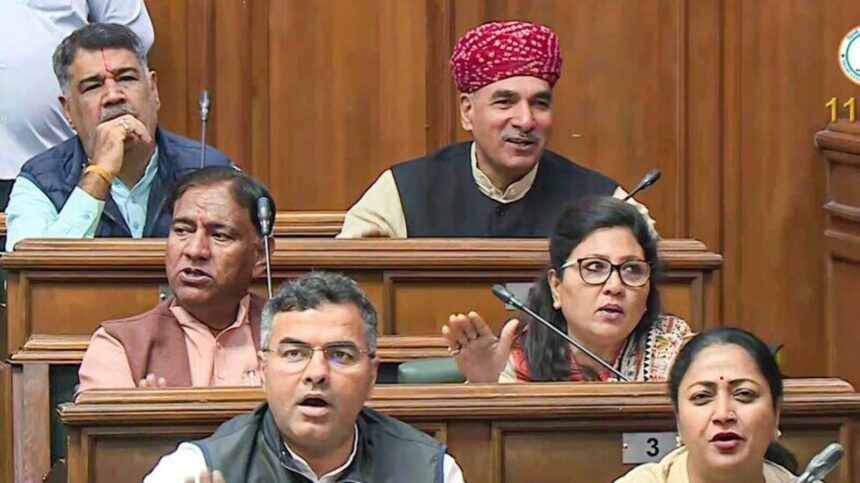A report from the Comptroller and Auditor General (CAG) concerning the Delhi Liquor Policy was presented in the Delhi Assembly on Tuesday, alleging that the group of ministers (GoM), led by then Deputy Chief Minister and Excise Minister Manish Sisodia, modified the recommendations set forth by the expert panel established to create the policy.
The CAG report – titled ‘Performance Audit on Regulation and Supply of Liquor in Delhi’ – is among the 14 reports that the Bharatiya Janata Party (BJP) government intends to present in the assembly in the upcoming days.
This 208-page CAG report, divided into eight chapters, underscores the failures in executing the now-repealed Delhi excise policy, which ultimately resulted in an estimated loss of ₹2,002 crores for the Delhi government.
The CAG contends that the GoM disregarded the panel’s suggestions and permitted private entities to manage wholesale operations, alongside other infractions.
The expert committee had advised that the government take over wholesale liquor trade via a state-owned beverage/wholesale corporation due to previous cases of dual ownership (wholesale and retail) through related private entities, as well as potential complicity by wholesalers in illegal liquor distribution, as noted in the report.
Moreover, the GoM acknowledged in its report that many wholesalers managed to acquire retail licenses through proxy ownership, enabling the sale of non-duty-paid liquor.
“Nevertheless, the GoM recommended the issuance of L-1 licenses to private players exclusively. The rationale provided in the GoM Report for not establishing such a government-owned wholesale corporation was the cited need for a thorough study and implementation, which would require time to enact, thereby granting provisional status to private players,” the report stated.
The L-1 licenses pertain to the wholesale distribution of Indian liquor.
“From the finally approved Excise Policy for the year 2022-23, it was observed that wholesale operations were slated to be managed by private players, contradicting claims made by the (Delhi) Government that private wholesale operations were merely a temporary solution,” the CAG report specifies on page 83.
The expert committee had recommended maintaining the collection of Excise Duty on a per-bottle basis while adjusting the pricing structure. “However, the GoM preferred advance collection of excise duty, represented as License fees, which was essentially detached from the actual sale of liquor,” the report indicates.
Wholesale and retail licensing regulations
The CAG report asserts that earlier provisions explicitly stated that no individual or family member with interests in any distillery, brewery, or bottling plant holding a wholesale distribution license could receive a retail license.
“However, the criteria for establishing relatedness were loosened in the new policy, leading to the issuance of licenses to entities linked by common interests,” the report claims.
The CAG report details numerous instances demonstrating evidence of relationships between licensees and common beneficial ownership.
In one instance highlighted in the report, connections were observed between M/s Indospirit, a wholesale licensee, and the zonal licensee M/s Khao Gali Restaurants, which holds two zones. Khao Gali Restaurants is identified as an associate company of M/s Indospirit Distribution Limited, which owns a 35 percent stake in M/s Indospirit (the wholesale licensee). Additionally, the director of Khao Gali also served as a director for an associated company of Indospirit Distribution Ltd, the report notes.
70% of wholesale market dominated by three entities
The CAG found that the liquor market in Delhi is predominantly controlled (71.70 percent) by three entities: Indospirit, Brindco, and Mahadev Liquor. “The first two are also exclusive suppliers for brands owned by United Spirits (Diageo), United Breweries (Heineken), and Pernod Ricard, three major domestic liquor manufacturers,” the report elaborates.
Additionally, the report discovered that out of 22 business entities overseeing 32 retail zones, the top eight entities (ranked by volume of sales per zone) managing 10 zones accounted for 44.79 percent of total sales, while the bottom 10 zones (managed by six entities) accounted for only 16.68 percent of sales.
The report also mentions cases where certain wholesalers supplied a ‘statistically significant proportion’ of their stock to specific zonal licensees, suggesting potential risks of ‘preferential business arrangements’ and close associations between the wholesalers and respective zonal licensees.
The easing of the conditions in the policy led to the issuance of licenses to entities where individuals shared common interests.
“Furthermore, several notable examples have emerged where a substantial portion of sales from a zonal licensee originated from a specific wholesaler. While this may not represent a problem in cases of procurement from wholesalers distributing popular brands, it could have implications akin to brand pushing and a restricted consumer choice,” the report concluded.
Stay updated with all the latest in Business News, Political developments, Breaking News, events, and Updates by downloading TheMint News App for Daily Market Insights.
MoreLess










